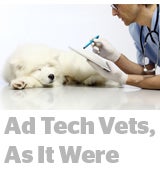 Ad tech expertise is increasingly finding its way out of the advertising industry and into seemingly unrelated verticals.
Ad tech expertise is increasingly finding its way out of the advertising industry and into seemingly unrelated verticals.
The most recent example is Petabyte, a veterinarian and pet industry technology company that launched last month. The company’s initial product is a vet clinic management solution called Rhapsody.
Petabyte CEO Michael Hyman and President Tim Mahlman also co-founded Vidible (where they held the same titles), and sold that to AOL, where they eventually became senior leaders for Verizon’s Oath (now Verizon Media).
“A big part of what led to the company is that Tim and I were both in ad tech seemingly forever, and we really wanted to do something that had more of a direct positive impact,” Hyman said.
The same interest in a fresh start outside advertising also helped land tech talent that would be hard to procure for legacy veterinary software systems, Hyman said. Petabyte’s VPs of product management and software engineering, Justin Gavel and Pavlo Grinchenko, were advertising product directors at Verizon.
The company is getting the band back together with investors, as well as former Oath engineers. Petabyte raised $8 million in December in a round led by Greycroft, the VC firm’s third investment in a startup led by Hyman. It is not a coincidence that Mahlman has also held an “entrepreneur in residence” position with Greycroft since 2011.
Those investors, like Petabyte’s founders, see a chance to compete in a category that hasn’t faced data-savvy competition.
“When you take a group of people who have been doing ad tech for 20 years and build another advertising business, you end up with the same thing,” Hyman said. “What we want is to introduce the veterinary world to the transparency and UIs we take for granted running multi-million dollar ad campaigns in a space.”
Vet clinic software is almost entirely on-premise technology with no data capabilities or cloud-based ability to sync with other providers, Hyman said. That’s why a person can go to any hospital in the country and the doctor could pull up their medical history but pet owners have to bring stacks of paperwork to new vets chronicling treatments and vaccines.
Veterinary software providers, as with many verticals that haven’t been overhauled by technology in 10 to 20 years, haven’t tackled problems with big data capabilities, Mahlman said.
Petabyte is in testing with some veterinarians and private equity companies that operate clinics, Mahlman said. Since a few private equity companies have consolidated significant share in the industry, there’s a chance to scale rapidly across operators that own many clinics. And private equity companies like having their data centralized for their own business intelligence and scouting potential acquisitions, he said.
They aren’t the only industry vets looking outside digital media.
AppNexus co-founder and former CEO Brian O’Kelley founded a software business that tracks supply chains for commodities like iron, copper or coffee. Jason Kelly, an ad tech vet with a string of exits, created a revenue management system for airlines.
Marketing roots can be hard to shake, however.
Once Petabyte’s Rhapsody software has traction with vet clinics, Hyman said its second phase of growth will be a consumer-facing business people can use to book and manage vet treatments, research and order pet food or connect with other pet services, like kennels or groomers.
That business will eventually include brand deals, a consumer app and a strong lead-gen funnel, Hyman said, since clinics need a mobile service for appointment booking and medicine prescriptions. “The veterinary software is the tip of the iceberg.”











